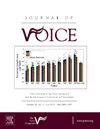Efficacy of Voice Therapy With Acapella Choice ® Device in Subjects With Vocal Fatigue Delivered Via Telepractice
IF 2.5
4区 医学
Q1 AUDIOLOGY & SPEECH-LANGUAGE PATHOLOGY
引用次数: 0
Abstract
Purpose
The present study aimed at assessing the effectiveness of remote voice therapy (telepractice) implemented with Acapella Choice device in subjects with vocal fatigue.
Methods
Thirty participants with vocal fatigue were randomly assigned to one of two treatment groups: (1) voice treatment with acapella Choice device plus vocal hygiene program (n=15), and (2) voice treatment with Water resistance therapy plus vocal hygiene program (n=15). Laryngoscopic assessment was conducted in all subjects to confirm diagnosis. Before and after voice therapy, participants underwent self-assessment of voice. Vocal Fatigue Index (VFI), Voice Handicap Index (VHI), and Vocal tract discomfort scale (VTDS) were used. Treatment period included six voice therapy sessions within 3 weeks, with a frequency of two therapy sessions per week. Each session lasted 30 minutes. For both groups, exercises consisted of a sequence of nine phonatory tasks performed with Acapella Choice (experimental group) and WRT (control group). Comparison for all variables were performed between experimental group and control group.
Results
Significant improvements were found when comparing Pre and Post measures for both groups. No significant differences were found when comparing Acapella Choice group and WRT group.
Conclusion
Remote physiologic voice therapy with Acapella Choice device and water resistance therapy seem to be both effective to improve voice in subjects diagnosed with vocal fatigue. No differences should be expected between these therapeutic protocols when treating patients with vocal fatigue. Moreover, both are effective at reducing tiredness of voice, voice avoidance, physical discomfort associated with voicing, subjective perception of sensory discomfort in throat, and reduction of physical, emotional, and functional impact of voice problems.
使用 Acapella Choice ® 设备通过远程练习对嗓音疲劳患者进行嗓音治疗的效果。
目的:本研究旨在评估使用 Acapella Choice 设备进行远程嗓音治疗(远程练习)对嗓音疲劳患者的效果:30名嗓音疲劳患者被随机分配到两组治疗中的一组:(1) 使用Acapella Choice设备进行嗓音治疗加嗓音卫生计划(15人);(2) 使用水阻力疗法进行嗓音治疗加嗓音卫生计划(15人)。所有受试者均接受了喉镜检查以确诊。在嗓音治疗前后,受试者进行了嗓音自我评估。评估采用声带疲劳指数(VFI)、嗓音障碍指数(VHI)和声带不适量表(VTDS)。治疗期包括 3 周内的 6 次嗓音治疗,每周 2 次。每次治疗持续 30 分钟。两组患者的练习均包括九项发音任务,分别由 Acapella Choice(实验组)和 WRT(对照组)完成。所有变量均在实验组和对照组之间进行比较:比较两组的前后测量结果发现,实验组和对照组的成绩都有显著提高。阿卡贝拉选择组与 WRT 组相比无明显差异:结论:使用 Acapella Choice 设备进行远程生理嗓音治疗和水阻力疗法似乎都能有效改善被诊断为嗓音疲劳患者的嗓音。在治疗嗓音疲劳患者时,这两种治疗方案之间不存在差异。此外,这两种疗法都能有效减轻嗓音疲劳、嗓音回避、与发声相关的身体不适、咽喉部感觉不适的主观感受,以及减轻嗓音问题对身体、情绪和功能的影响。
本文章由计算机程序翻译,如有差异,请以英文原文为准。
求助全文
约1分钟内获得全文
求助全文
来源期刊

Journal of Voice
医学-耳鼻喉科学
CiteScore
4.00
自引率
13.60%
发文量
395
审稿时长
59 days
期刊介绍:
The Journal of Voice is widely regarded as the world''s premiere journal for voice medicine and research. This peer-reviewed publication is listed in Index Medicus and is indexed by the Institute for Scientific Information. The journal contains articles written by experts throughout the world on all topics in voice sciences, voice medicine and surgery, and speech-language pathologists'' management of voice-related problems. The journal includes clinical articles, clinical research, and laboratory research. Members of the Foundation receive the journal as a benefit of membership.
 求助内容:
求助内容: 应助结果提醒方式:
应助结果提醒方式:


